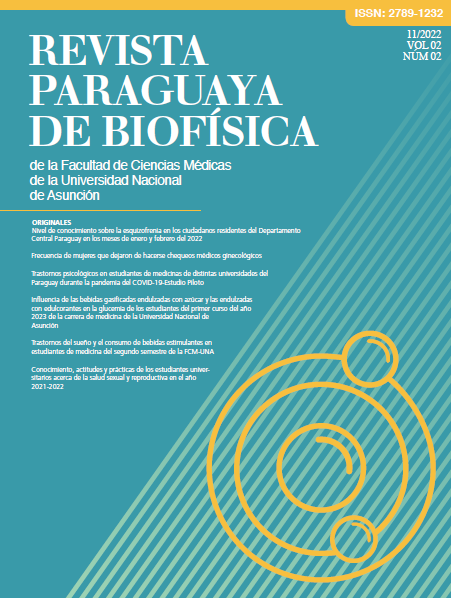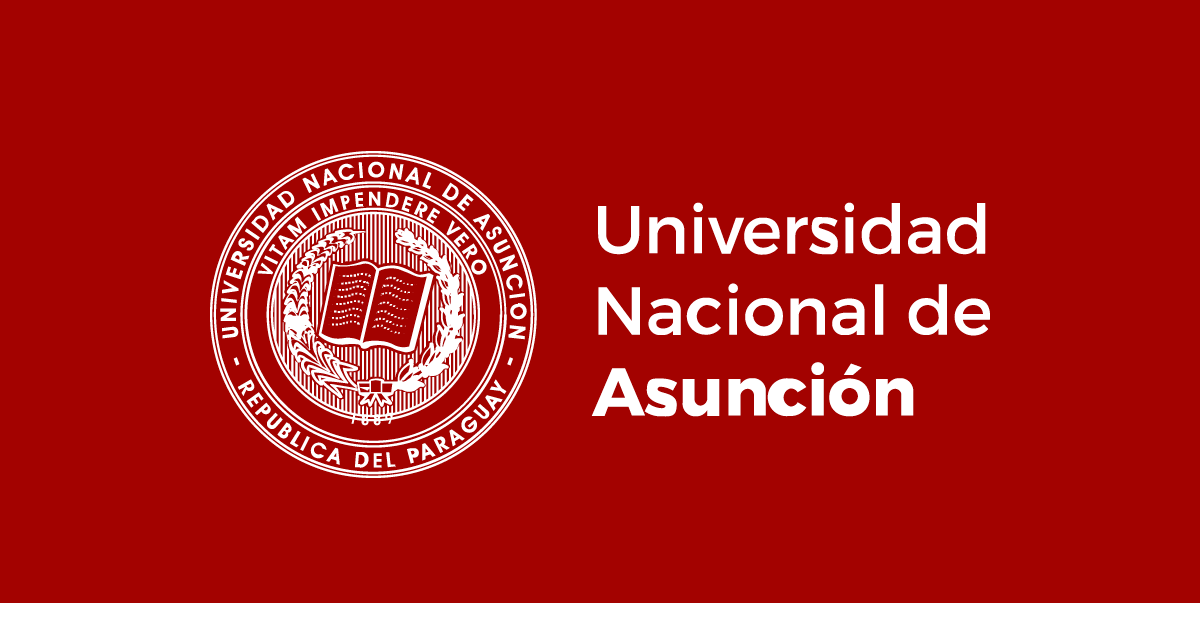Trastornos del sueño y el consumo de bebidas estimulantes en estudiantes de medicina del segundo semestre de la FCM-UNA
Palabras clave:
trastornos del sueño, bebidas estimulantes, estudiantes de medicinaResumen
Objetivo: Determinar la frecuencia de trastornos del sueño en los alumnos del segundo semestre de la Facultad de Ciencias Médicas de la Universidad Nacional de Asunción y el consumo regular de bebidas estimulantes.
Materiales y método: Se realizó un estudio observacional, descriptivo de corte transversal. La población enfocada fue estudiantes de la Facultad de Ciencias Médicas de la Universidad Nacional de Asunción. Se utilizó una encuesta compuesta por un cuestionario sobre el consumo de bebidas estimulantes y el Insomnia Severity Index.
Resultados: Del total de encuestados (n=118) el 52,5 % afirma tener algún problema que dificulte su ciclo de sueño normal. Un 58,5 % afirma haber consumido bebidas estimulantes con el fin de estar activo y despierto para poder realizar alguna actividad académica. El tipo de bebida más consumida fue el café (76,3 %), seguido por infusiones (47,4 %), bebidas energizantes (39,5 %) y por último bebidas alcohólicas (10,5 %).
Conclusiones: La frecuencia de trastornos del sueño en los estudiantes de medicina encuestados fue menos de la mitad del total de los encuestados siendo mayor la cantidad de estudiantes que consumen bebidas estimulantes en relación a los que no consumen.
Referencias
(1) La importancia de dormir para presentar un buen estado de salud y bienestar emocional [Internet]. Semal.org. [citado el 27 de febrero de 2023]. Disponible en: https://www.semal.org/es/prensa-tv/la-importancia-de-dormir-para-presetar-un-buen-estado-de-salud-y-bienestar-emocional
(2) Barriga Hernández FJ, Barón Rubio M, Dobato Ayuso JL, Pareja Grande JA. Trastornos del sueño. Medicina [Internet]. 2003 [citado el 27 de febrero de 2023];8(102):5484–7. Disponible en: https://medlineplus.gov/spanish/ency/article/000800.htm
(3) Www7.uc.cl. [citado el 27 de febrero de 2023]. Disponible en: https://www7.uc.cl/sw_educ/enferm/ciclo/html/general/sueno.htm#:~:text=Estas%20dos%20etapas%20NREM%20y,la%20duraci%C3%B3n% 20total%20del%20sue%C3%B1o.
(4) Cúneo F, Schaab N. Hábitos de consumo de bebidas en adolescentes y su impacto en la dieta. Diaeta [B.Aires]; 2013.
(5) Cote M, Rangel C, Sánchez M, Medina A. Bebidas energizantes: ¿Hidratantes o estimulantes?. Rev Fac Med. 2011; 59:255- 266.
(6) Al-Shaar L. Health effects and Public Health Concerns of energy Drink Consumption in the United States: A Mini-Review. Frontiers in public health 2017; 5, 225.
(7) Instituto Mexicano de Seguridad Social. Guía de práctica clínica Diagnóstico y tratamiento de los trastornos del sueño. México D.F. Consejo de Salubridad General. 2013.
(8) Gómez M, Danglot C, Huerta S, García G. El estudio de casos y controles: su diseño, análisis e interpretación, en investigación clínica. Revista mexicana de pediatría, 2003; 70(5), 257-263.
(9) Rosales-Aguilar M, Castillo Ortiz E, Díaz Trujillo CG, Sánchez-Díaz M de los R. Consumo de bebidas con cafeína y sus efectos en estudiantes de Medicina de la Universidad Autónoma de Baja California, Tijuana / Consumption of Beverages with Caffeine and its Effects in Medical Students of the Autonomous University of Baja California, Tijuana. RICS Rev Iberoam las Ciencias de la Salud. 2018;7(13):33–51.
(10) 10. Sanchez SE, Martinez C, Oriol RA, Yanez D, Castañeda B, Sanchez E, et al. Sleep quality, sleep patterns and consumption of energy drinks and other caffeinated beverages among Peruvian college students. Health (Irvine Calif). 2013;05(08):26–35. [ Links ]
(11) Mendoza L, Marco G, Gonzalo C V., Ali AKC, Rosales A, Chávez R, et al. Uso de bebidas energizantes y síntomas de insomnio en estudiantes de medicina de una universidad peruana. Rev Chil Neuropsiquiatr [Internet]. 2021 [citado el 20 de febrero de 2023];59(4):289–301. Disponible en: http://www.scielo.cl/scie-lo.php?script=sci_arttext&pid=S0717-92272021000400289&lng=es&nrm=iso&tlng=es
(12) AlQahtani MS, Alkhaldi TM, Mutib Al-Sultan A, Bin Shihah AS, Saad Aleid A, Khater Alzahrani Z, et al. Sleeping Disorders among Medical Students in Saudi Arabia; in Relation to Anti-Insomnia Medications. Egypt J Hosp Med. 2017;69(7):2750.
(13) García Gascón Á, Querts Méndez O, Hernández González RC, Agüero Martén R, Cascaret Soto X. Algunas variables biológicas relacionadas con trastornos del sueño en estudiantes de primer año de medicina. MEDISAN. 2015;19(8):978–83.
Descargas
Publicado
Número
Sección
Licencia
Derechos de autor 2023 Soledad Santander Villalba, Pilar Ana María Servín Barrios, Juan Pablo Stumpfs Díaz, Julio César Vargas Ayala, Abel Adrián Vázquez Pavón, Andrea Belén Velázquez Ojeda, Paz Alexandra Magalí Villamayor Mancuello, Anahí Ofelia Vera San Miguel

Esta obra está bajo una licencia internacional Creative Commons Atribución 4.0.





